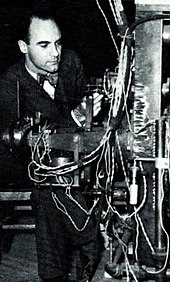Carl David Anderson
Carl David "Charles" Anderson (born September 3, 1905 in New York , † January 11, 1991 in San Marino , California ) was an American physicist and Nobel Prize winner.
Life
Anderson studied at the California Institute of Technology (Caltech) in Pasadena, California , where he earned his bachelor's degree in 1927 and his doctorate in 1930 with a thesis on the distribution of electron emissions in cosmic gases under the action of X-rays . Just two years later, Anderson, now working as a Research Fellow and employee of Robert Andrews Millikan at Caltech, succeeded in detecting the positron postulated by Paul Dirac in 1929 with the help of the Wilson chamber . Together with Seth Neddermeyer , he demonstrated in 1932 that high-energy gamma radiation causes the emission of positrons when it penetrates matter. This was the first example of antimatter . For his discovery of the positron he received the Nobel Prize in Physics in 1936 , together with Victor Franz Hess for his work, which led to the discovery of cosmic rays in Vienna in 1912.
Together with Seth Neddermeyer , Anderson discovered muons in 1936 , short-lived charge-carrying particles with a mass 207 times the mass of electrons. In 1933 Anderson was appointed assistant professor and in 1939 professor of physics at Caltech, the offer of a managerial position in the American uranium project, later the Manhattan project , he declined. During the war he worked on various government research projects, particularly in the field of missile research and development. The solid-propelled rockets developed at Caltech were used for the first time in the final phase of the war.
Anderson remained a professor at Caltech until 1976 (from 1977 he was Professor Emeritus there) and was in the Department of Physics, Mathematics and Astronomy at Caltech from 1962 to 1970. In 1934 he became a Fellow of the American Physical Society . He was a member of the National Academy of Sciences and the American Philosophical Society since 1938 . In 1950 he was elected to the American Academy of Arts and Sciences . He died in 1991 at the age of 85 and is buried in the Forest Lawn Memorial Park cemetery in Los Angeles .
literature
- Carl David Anderson and Richard J. Weiss: The discovery of anti-matter - the autobiography of Carl David Anderson, the youngest man to win the Nobel prize. World Scientific, Singapore 1999, ISBN 981-02-3680-8
Web links
- Information from the Nobel Foundation on the award ceremony for Carl David Anderson in 1936 (English)
- William H. Pickering: Carl David Anderson (1905-1991) - A Biographical Memoir. (pdf) National Academy of Sciences , accessed January 21, 2018 .
- Anderson The positive electron Physical Review 1933, discovery of positron
- Anderson, Neddermeyer Note on the nature of cosmic ray particles , Physical Review 1937, Discovery Muon
- Carl D. Anderson. Biography. In: aip.org. Retrieved January 21, 2018 .
- Oral History Interview 1966 and Oral History Interview 1979
- Wolfgang Burgmer: August 2nd, 1932 - Carl D. Anderson discovers the antimatter WDR ZeitZeichen (podcast).
Individual evidence
- ↑ CD Anderson: The Positive Electron . In: Physical Review . tape 43 , no. 6 , 1933, pp. 491–494 , doi : 10.1103 / PhysRev.43.491 ( online ).
- ↑ Discovery of the muons
| personal data | |
|---|---|
| SURNAME | Anderson, Carl David |
| ALTERNATIVE NAMES | Anderson, Charles |
| BRIEF DESCRIPTION | American physicist |
| DATE OF BIRTH | September 3, 1905 |
| PLACE OF BIRTH | New York City |
| DATE OF DEATH | January 11, 1991 |
| Place of death | San Marino, California , USA |
